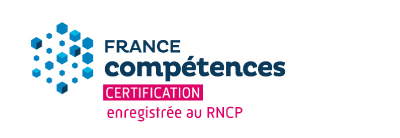LES CERTIFICATIONS PROFESSIONNELLES
Les certifications professionnelles, couramment désignée par l’expression « Titres RNCP », sont enregistrées au Répertoire national des certifications professionnelles (RNCP) en France et permettent la validation des compétences et des connaissances acquises nécessaires à l’exercice d’un métier. Elles sont classées par niveau de qualification et domaine d’activité.
Toutes les certifications professionnelles portées par CDE FEDE France peuvent être validées après un parcours de formation initiale (soit sous statut d’élève ou d’étudiant, soit en contrat d’apprentissage, soit en contrat de professionnalisation), après un parcours de formation continue et par la VAE.
Toutes les certifications professionnelles sont organisées en blocs de compétences : ceux-ci constituent une modalité d’accès modulaire et progressive à la certification et facilitent l’accès et l’adaptation à un métier visé dans une logique d’employabilité. L’acquisition de la certification par blocs est accessible aux candidats de la formation continue et de la VAE.
- Présentation des blocs de compétences par CDE FEDE France : CDE – FEDE – Présentation blocs de compétences.pdf
CDE FEDE France dispose actuellement de plusieurs certifications professionnelles enregistrées au RNCP. La liste des organismes de formation habilités à former est consultable sur la fiche de chaque certification sur le site de France compétences.


Chargé de développement des ressources humaines – Niveau 6
Date d’échéance de l’enregistrement : 21 décembre 2026
Le chargé de développement des ressources humaines appartient à la famille des métiers de conseil et de pilotage. Il contribue à la définition de la stratégie RH de l’entreprise, au développement et à la gestion des ressources humaines de son groupe de protection sociale. Le chargé de développement des ressources humaines occupe un poste polyvalent assurant plusieurs rôles au sein de l’entreprise. En premier lieu, il joue un rôle stratégique en coordonnant une équipe opérationnelle chargée de différents aspects techniques tels que la gestion des paies, des congés ou encore des formations. De plus, endossant un rôle de référent, il assume la responsabilité de la gestion du personnel, totale ou partagée, en fonction de la taille de l’entreprise. Parallèlement, il veille au respect des obligations légales. Enfin, ce professionnel est fortement impliqué dans le développement des compétences des salariés dans le cadre de la GEPP. À cette fin, il encourage la diversité dans le recrutement ainsi que le développement des compétences des salariés par l’évaluation, la formation et l’évolution de carrière.
Conseiller clientèle en banque et assurance – Niveau 6
Date d’échéance de l’enregistrement : 31 mai 2027
Le conseiller clientèle en banque et assurance a pour mission principale le développement de l’activité de son établissement et la commercialisation de produits bancaires ou d’assurance. Dans ce cadre, il assure la gestion de son portefeuille client et la relation privilégiée qu’il entretient avec chaque client, il est garant des risques pour son établissement notamment en termes de respect des obligations réglementaires de son établissement bancaire.
Le conseiller clientèle en banque et assurance fidélise, conseille et accompagne ses clients dans la gestion courante de leurs finances. Il peut gérer un portefeuille de clients particuliers ou d’entreprises. Il cherche à attirer des nouveaux clients ainsi qu’à proposer les services et produits bancaires et/ou d’assurance à l’aune de ses objectifs commerciaux.
Manager de projets informatiques – Niveau 7
Date d’échéance de l’enregistrement : 26 avril 2027
Le manager de projets informatiques dispose des compétences informatiques techniques et des compétences en gestion de projet et en management
d’équipe lui permettant de superviser le développement de projets, d’organiser et accompagner le travail des développeurs, des architectes d’infrastructures informatiques et des administrateurs de réseau, qu’ils soient des collaborateurs ou des prestataires.
Manager des organisations – Niveau 7
Date d’échéance de l’enregistrement : 10 février 2026
Dans un contexte concurrentiel où la mondialisation et la transformation digitale bouleversent les sphères de notre société, les organisations font face à de nombreux défis qui nécessitent plus de flexibilité et une évolution des pratiques managériales afin de s’adapter à un marché en perpétuelle mutation.
Contact
Pour tout renseignement : certification@fede.org

